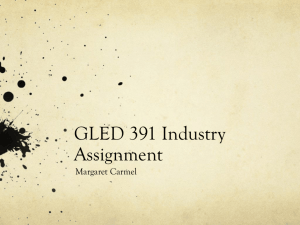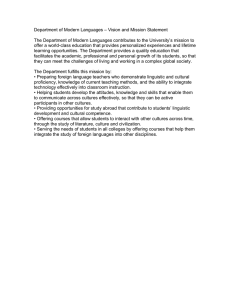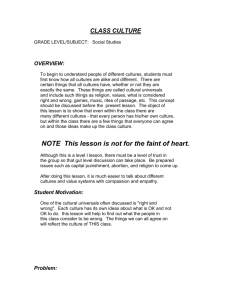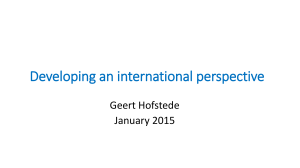Document 12630329
advertisement
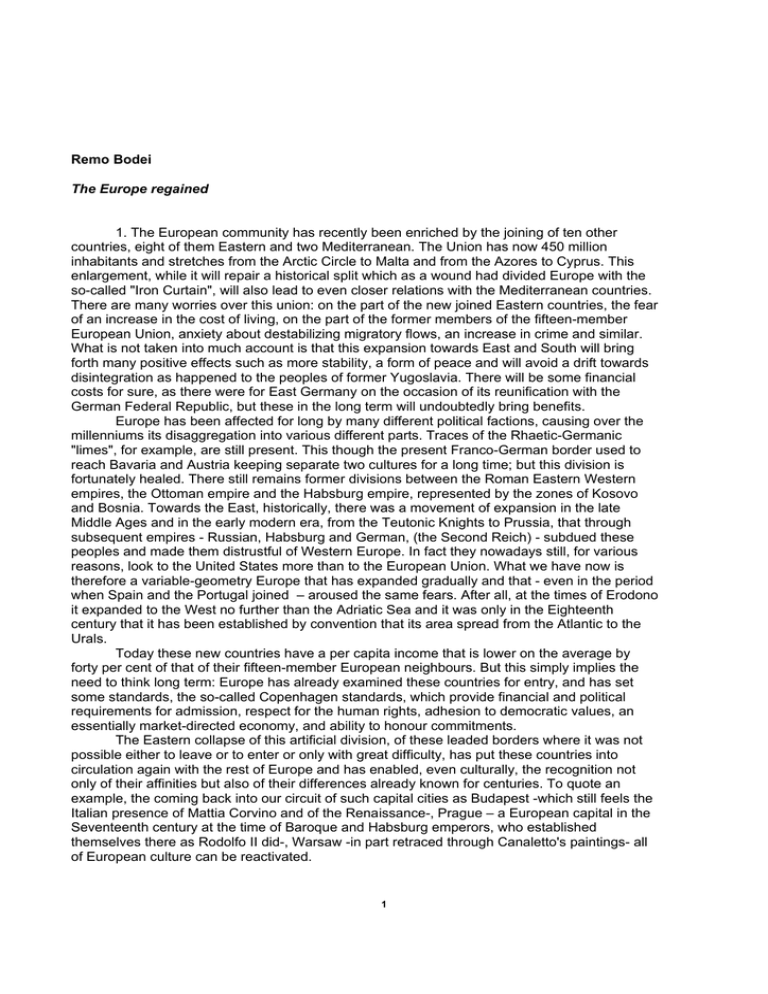
Remo Bodei The Europe regained 1. The European community has recently been enriched by the joining of ten other countries, eight of them Eastern and two Mediterranean. The Union has now 450 million inhabitants and stretches from the Arctic Circle to Malta and from the Azores to Cyprus. This enlargement, while it will repair a historical split which as a wound had divided Europe with the so-called "Iron Curtain", will also lead to even closer relations with the Mediterranean countries. There are many worries over this union: on the part of the new joined Eastern countries, the fear of an increase in the cost of living, on the part of the former members of the fifteen-member European Union, anxiety about destabilizing migratory flows, an increase in crime and similar. What is not taken into much account is that this expansion towards East and South will bring forth many positive effects such as more stability, a form of peace and will avoid a drift towards disintegration as happened to the peoples of former Yugoslavia. There will be some financial costs for sure, as there were for East Germany on the occasion of its reunification with the German Federal Republic, but these in the long term will undoubtedly bring benefits. Europe has been affected for long by many different political factions, causing over the millenniums its disaggregation into various different parts. Traces of the Rhaetic-Germanic "limes", for example, are still present. This though the present Franco-German border used to reach Bavaria and Austria keeping separate two cultures for a long time; but this division is fortunately healed. There still remains former divisions between the Roman Eastern Western empires, the Ottoman empire and the Habsburg empire, represented by the zones of Kosovo and Bosnia. Towards the East, historically, there was a movement of expansion in the late Middle Ages and in the early modern era, from the Teutonic Knights to Prussia, that through subsequent empires - Russian, Habsburg and German, (the Second Reich) - subdued these peoples and made them distrustful of Western Europe. In fact they nowadays still, for various reasons, look to the United States more than to the European Union. What we have now is therefore a variable-geometry Europe that has expanded gradually and that - even in the period when Spain and the Portugal joined – aroused the same fears. After all, at the times of Erodono it expanded to the West no further than the Adriatic Sea and it was only in the Eighteenth century that it has been established by convention that its area spread from the Atlantic to the Urals. Today these new countries have a per capita income that is lower on the average by forty per cent of that of their fifteen-member European neighbours. But this simply implies the need to think long term: Europe has already examined these countries for entry, and has set some standards, the so-called Copenhagen standards, which provide financial and political requirements for admission, respect for the human rights, adhesion to democratic values, an essentially market-directed economy, and ability to honour commitments. The Eastern collapse of this artificial division, of these leaded borders where it was not possible either to leave or to enter or only with great difficulty, has put these countries into circulation again with the rest of Europe and has enabled, even culturally, the recognition not only of their affinities but also of their differences already known for centuries. To quote an example, the coming back into our circuit of such capital cities as Budapest -which still feels the Italian presence of Mattia Corvino and of the Renaissance-, Prague – a European capital in the Seventeenth century at the time of Baroque and Habsburg emperors, who established themselves there as Rodolfo II did-, Warsaw -in part retraced through Canaletto's paintings- all of European culture can be reactivated. 1 2. Europe is essentially a place of diversities; after the Roman empire there has never been any form of long lasting unification: Charles the Great did not succeed, Napoleon for a short while had a sort of hegemony, but as has been pointed out, from Machiavelli to Guizot, Europe is made up of differences, and the goal of unifying them is absurd. So aiming to achieve a cultural integration, a melting pot similar to the United States', would be ridiculous. What would be fine, at least at the beginning, would be to encourage a sort of shared institutional framework, a constitutional patriotism, to make the newly joined European countries obey together with the old ones- rules regulating the principles of democracy, the expansion of human rights, adaptation to new economic structures. The whole system should be strengthened, especially for new European generations, by an education system aimed to create a European citizenship, whose wealth must arise from the catalyst of differences within a shared project of growth. Europe bears great responsibility to the United States and the rest of the world. Further to strengthen within its borders that “mild” regime which is democracy, Europe must establish some more active relations with other parts of the world, with the United States and the rest of the planet, taking crisis and global difficulties on itself. Europe cannot simply appear – especially after its colonial past – as a beacon or exporter of freedom. It must blend freedom and equality. Preventing freedom from becoming a privilege in a world torn by conflicts is in the interest of freedom itself. The year 1989 should be taken as a symbolic date, not only for what we today talk of so much – the fall of the Berlin Wall – but for the failure, maybe not definitive, of a big historical project, aimed to spread equality among the citizens. This project failed because in the Socialist countries the will to achieve equality instead produced more inequality; but this failure must not lead to, especially for those countries which were used to a state-controlled economy to receive all, or what little they received from the State, to develop models of, so to speak, "wild" liberalism, as occurred in the old Democratic Germany. Of course, the market-directed economy in some ways has shown its supremacy, but what Europe must do is to marry again the requirements for freedom and those for equality, and therefore be a promoter not of an immediate transplant, even if necessary, of political formulae historically not rapidly absorbable, but of economic models which can represent transitional phases. Each of these countries has its own story and it must interact with those of the other countries. Each of them has its own characteristics, which must be kept at different levels: you can be European citizens, you can be Italians, you can be Tuscans or Neapolitans. Obviously this must not prevent some kind of attachment to local homelands, or some localism, and it does not imply at all that the State, as a junction between local and European Community, must disappear. After all, there are three types of identity to play on: one is a "self-referential" identity, based on the logical scheme a=a (Spanish because Spanish, French because French), as if it were by nature; then there is an identity consisting in the acceptance of the developments – I am like this and I am proud of it – as it happened in the Soviet Union in the twenties and thirties, with the cult of the proletariat, and as some African poets did, such as Léopold Sédar Senghor, or Césaire with the négritude, they used to say “yes, you whites have the intelligence, we instead have imagination, passion”, unaware of the fact that this way they were underselling the intelligence. Finally there is the third type, which consists of considering European identity as a yard in full operation, as a rope made up of many threads, which becomes stronger and stronger as the threads twist together. 3. In this construction called Europe, and in the future probable enlargement there will be- the joining of Bulgaria and Romania in 2007 is pretty sure and of Turkey later probable, in this last I hope strongly, as it is a secular Muslim country useful as an extension of Europe into areas to be settled - all of this will probably bring benefit, for example to relations between the Greek and the Turkish communities in Cyprus, to the problem of the Hungarians in Transylvania, of the Romanians in Moldavia, and maybe later on of the Serbs in Croatia, and 2 maybe, indirectly it will dissolve even some tensions in the Baltic Countries with the Russian people. From this collection of events I have presented, the relevant thing to point out is that the enlargement of Europe must be seen as a big opportunity and that the fears for the immediate are fears which I am pretty sure will have no follow-up. It will bring benefit in terms of stability and, hopefully, of more prosperity in the next decades. The European identity, even compared to the national ones, is one to rebuild. Throughout Europe there would undoubtedly be submerged stories, “cut-off languages”, rejected identities, cultures at risk of disappearing. But against any form of racism or of chauvinism a distinction must be made between the refusal of any hierarchy between cultures (each of them has its own dignity) and the attempts at narrow-mindedness by small and big cultures in an exasperated autochthonous pride. Their identity should, on the contrary, be defined not only according by opposition, but also in relation to the differences open to universalising processes, to be linked with other cultures, to a processing of other patterns of belonging and citizenship. Europe is, and must be, a yard in full operation, not an isolated fortress. Against any form of racism and of chauvinism, what is needed is the rejection of hierarchies between cultures, the bearing of concepts such as the métissage of all the mankind, the reciprocal cultural cross-polination, the reevaluation of “differences”, the rejection of Occidental condescension which declares itself as the bearer of the only civilization worth of this name. 3
